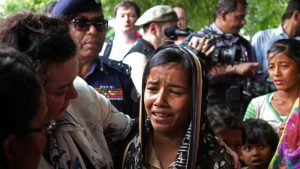
Special Address by The Honourable Bob Rae, The Canadian Prime Minister’s Special Envoy on Myanmar



By Nadia MASSIH | Published by France 24 on May 31, 2018 We speak to Maung Zarni, a human rights campaigner, academic and co-author of “The Slow-Burning Genocide of Myanmar’s Rohingya”. He joins us on set a week after Amnesty International published a report detailing a massacre carried out by Rohingya militants last August in Myanmar’s Rakhine state, where nearly 100 Hindus were killed. Zarni vocally criticises Amnesty, saying the report whips up anti-Rohingya sentiment, not just in Myanmar but across Southeast Asia.

In Multi Language Versions: Arabic | Turkish | French | Spanish | Bosnian-Croatian-Serbian | Indonesian | Kurdish-Kurmanchi | Albanian | Russian | By Sena Guler | Published by Anadolu Agency on May 31, 2018 Shirin Ebadi reminds de facto leader of Myanmar the moral and legal responsibility of Rohingya genocide ANKARA — Iranian human rights advocate and Nobel laureate Shirin Ebadi on Thursday called for a trial in an international court for Myanmar’s de facto leader and military generals. Ebadi said in a statement: “I wish that Aung San Suu Kyi, as the leader of the party in power, and the Myanmar generals

“I want @ARSA_Official to be tried at ICC for the crimes against humanity, if in fact they were proven guilty, just as I want Myanmar Generals and their accomplice Aung San Suu Kyi tried at ICC.” @drzarni said. Full version here: https://t.co/w5KQKUSL8u pic.twitter.com/2HYrumT6MH — Ro Nay San Lwin (@nslwin) May 29, 2018 “Amnesty’s 22 May report on Myanmar only deepens anti-#Muslim fear and hatred. #Amnesty produced the evidence that is extremely underwhelming” (as to support its claim that #ARSA slaughtered Hindu villagers). — @drzarni #Rohingya #MyanmarGenocide pic.twitter.com/eToySZrYcr — Ro Nay San Lwin (@nslwin) May 29, 2018 #Amnesty accuses valid

By John Packer | Published by National Post on May 29, 2018 Opinion: Nine months since the violent attacks of Aug. 25, 2017, the first of thousands of pregnancies as a result of rape are coming to termNine months since the violent attacks of Aug. 25, 2017, and thereafter forced 700,000 Rohingya to flee to neighbouring Bangladesh, the first of thousands of pregnancies as a result of rape are coming to term. For these women and girls, the ongoing crisis is inescapably urgent. The imminent births won’t wait. Humanitarian organizations are exasperated by the inadequacy of responses to date. The

By Shafiur Rahman | Published by The Quint on May 25, 2018 Amnesty International’s latest briefing report on the Rohingya crisis has managed to create a stir in an already riotous social media scene around Myanmar. The report has attracted widespread condemnation, including a comment by the Bangladesh foreign minister, branding it “illogical.” The report focuses on a particular massacre of Hindus in Northern Rakhine state. Eight months ago, over the course of two days, the Myanmar authorities dug up the remains of 45 people, purportedly of Hindus, and instantly laid the blame on the Arakan Rohingya Salvation Army (ARSA). Myanmar

By Jacob Goldberg | Published by Coconuts Yangon on May 25, 2018 A fissure that has long been forming within the Rohingya rights community was exposed this week when Amnesty International released a report that many found less than helpful to their cause. The report claims to have solved the mystery of who killed 53 Hindu villagers in the hours after the Arakan Rohingya Salvation Army (ARSA) began its assault on police outposts in northern Rakhine State on Aug. 25, 2017. When stories of the massacre first came to light a few days later, the perpetrators were consistently described as masked

By Dr. Maung Zarni | Published by Anadolu Agency on May 24, 2018 CAMBRIDGE, UK –With the 22 May release of its report “Attacks by the Arakan Rohingya Salvation Army on Hindus in northern Rakhine State”, Amnesty International has poured fuel on the anti-Muslim fear and loathing in Burma as well as in Modi’s violent anti-Muslim India. To be sure, no human rights activist must object to human rights watchdogs carrying out their own mission. However, it is deeply disturbing that Amnesty International, a Nobel-prize winner, released its latest report with a callous disregard as to the predictable international consequences

By Sarah Taylor | Published by The Global Observatory on May 21, 2018 Almost a year after hundreds of thousands of Rohingya Muslims were forced to flee their home country into Bangladesh, the challenges of providing assistance to refugees and of addressing violations in Myanmar remain. During the peak of migration out of Myanmar, a key tactic used to drive the Rohingya out of their homes and villages was sexual violence against women and girls. This year’s report of Secretary-General Antonio Guterres on sexual violence in conflict includes the Myanmar military for the first time. Earlier this month, representatives of the UN

By Tun Khin | Published by Al Jazeera on May 20, 2018 The UN Security Council must refer the Rohingya’s case to the International Criminal Court. When I visited Bangladesh a few weeks ago, I heard heart-wrenching stories from some of the hundreds of thousands of Rohingya people who have fled atrocities in Myanmar. I met women who had been raped by soldiers, children who had seen their parents shot dead before their very eyes, and families who had lost everything. But if there was one thing that united almost all survivors, it was the desire for justice. As a